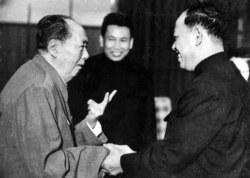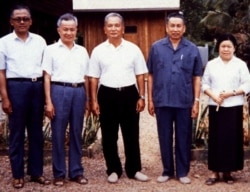During a conversation over lunch at a restaurant near Siem Reap’s Angkor Archeological Park, Yung Moeun, a former cadre of the Khmer Rouge, said she was a close aide to the regime’s head, Pol Pot, and more so on a personal level.
“The personal relationship between him and me was special; he regarded me as a special [aide],” Yung Moeun said in 2018. Yung Moeun said she was a trusted part of the Pol Pot’s inner circle, with the former cadre claiming she personally cooked food for him over a 14-year period. She was later stationed as a diplomatic envoy to China.
“From the way we spoke and interacted, we were as close as he was with his own children.”
Yung Moeun died on March 4, according to her son, Pich Socheat, who spoke to VOA Khmer last week. Her body was cremated in Anlong Veng district in the northern province of Oddar Meanchey, one of the last strongholds of the Khmer Rouge before the civil war ended in late 1998.
The former cadre was 73 and is survived by three sons. Her husband, who was with her during her stint in China, died in 2004.
Pich Socheat said Yung Moeun was diagnosed with terminal stomach cancer last year and made frequent medical trips to Thailand to receive treatment.
Born Yung Yem in 1948, she grew up during the twilight years of French colonial rule, in the riverine village of Prek Po in Kampong Cham Province’s Srey Santhor District, according to her son.
Yung Moeun was still a student when she decided to join the Khmer Rouge’s revolutionary movement in 1967. This roughly coincided with the communist movement’s retreat into Cambodia’s forests, following the Samlaut rebellion, during which government forces violently cracked down on farmers, related to land disputes.
The new recruit then rose through ranks to work in the secretive headquarter of the Khmer Rouge in Ratanakiri province, and started cooking and managing household affairs for the communist high command.
Yung Moeun’s relationship to Pol Pot, through the medium of food, was interesting in light of how access to food played a key role during the genocidal regime, said Youk Chhang, director of the Documentation Centre of Cambodia (DC-Cam), which documents all aspects linked to the Khmer Rouge.
“And Pol Pot – like everyone else – loved to eat good food, while his policies starved millions of his compatriots to death.
“During the Khmer Rouge, ‘food’ was [a defining factor] between good and evil, betrayal and trust, life and death.”
Pol Pot’s favorite dishes were sour fish soup and dressed salads, Yung Moeun recalled, during her 2018 interview. “Pol Pot loved making jokes by saying the opposite thing. For example, if the food we cooked was a bit salty, he would say the food was watery.”
Yung Moeun said she continued to remain Pol Pot’s personal cook from 1967 to 1975. But, when the Khmer Rouge seized power in 1975, Yung Moeun was sent to Beijing as the Cambodian embassy’s political liaison officer, in charge of direct communication with Pol Pot’s all-powerful Office 870.
At the time, her husband, Pich Cheang, was made the ambassador in Beijing. She returned in 1984 to resume her duties as Pol Pot’s personal cook.
“She would be remembered as a staunch and steadfast loyalist of Pol Pot, Democratic Kampuchea and Pol Pot,” said Suong Sikoeun, a member of the Khmer Rouge regime, who once worked with Yung Moeun at the embassy in Beijing as the chargé d'affaires.
While Suong Sikoeun’s position in the embassy was senior to that of Yung Moeun, she was the one who actually pulled the strings. He said she was in charge of coordinating communications between Chinese leaders and Phnom Penh-based Office 870, Pol Pot’s secretive command center.
“She had de facto power to supervise the embassy’s business,” Suong Sikoeun said.
Andrew C. Mertha, director of the John Hopkins University’s China Studies Program, said Yung Moeun was tasked to supervise Pol Pot’s much-publicized state visit to Beijing in 1977 towards the end of the Cultural Revolution.
It was during this meeting, Mertha said, the Chinese Communist Party pressed their Cambodian counterparts to moderate their hardline approach to ruling the country.
“However, Chinese appeals fell on deaf ears, as she recounted to me,” Andrew C. Mertha told VOA Khmer in an email. “Although she seems to have loved her time in China, she was an unswervingly loyal officer to Office 870.”
Mertha, who is the author of ‘Brothers In Arms,’ has researched China’s relationship with Khmer Rouge-controlled Cambodia, which included Yung Moeun’s role in diplomatic affairs.
An avid admirer of Pol Pot’s “patriotic heroism”, Yung Moeun was quick to acknowledge in 2018 that her former boss did commit mistakes in his leadership role, though not elaborating on these errors.
The genocidal regime resulted in the deaths of at least 1.7 million people from mass executions, forced labor, starvation and illness.
“What went wrong is on him. [But] I know that he couldn’t control everything and to identify all who was good and who was bad,” she said.
What was clear for Yung Moeun was the goal of the Khmer Rouge’s revolutions.
“They had absolute resolve joining with their heads and arms that they could even leave their infants behind just to pursue the firm wisdoms…I myself never had time for my children.”
Asked what he felt about his parents’ participation into a revolution accused of genocide, Pich Socheat said their values were more important to him than their actual actions.
“What I learned from them shall only be about loving the country and the people, helping underprivileged persons, placing high respects on human lives, and being patriotic,” said the son of Pol Pot’s longtime cook.









